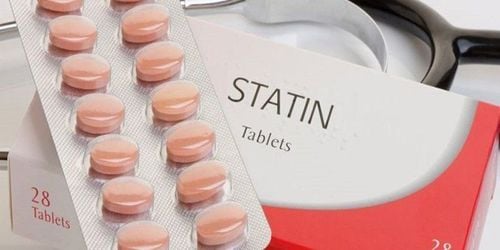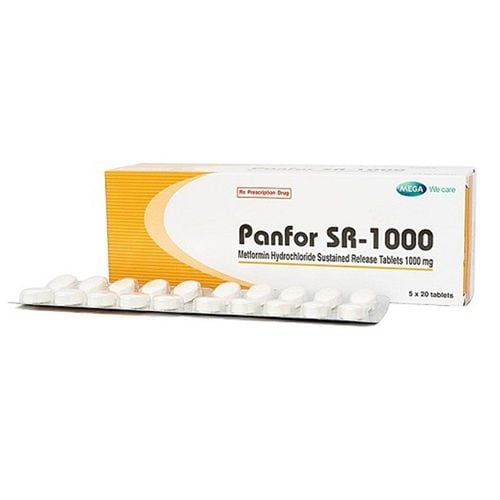This is an automatically translated article.
Valpres 160mg is a prescription drug used to treat high blood pressure, after myocardial infarction, heart failure, ... for both children and adults. The use of Valpres 160mg drug should be strictly followed all the recommendations of the doctor to ensure the minimum risk of patients experiencing side effects.
1. What is Valpres 160mg?
Valpres 160mg belongs to the group of cardiovascular drugs, used according to the doctor's prescription. Each box of Valpres 160mg will include 2 blisters × 14 tablets, each tablet contains the following active ingredients:
Main active ingredient: Valsartan 160mg. Other excipients: Crospovidone, Microcrystalline Cellulose, Magnesium stearate, Colloidal Anhydrous Silicon, Yellow Iron Oxide (E172), Black Iron Oxide (E172), Red Iron Oxide (E172), Hypromellose, Macrogol 8000 and Titanium dioxide (E171).
2. Uses of Valpres 160mg
Currently, Valpres 160mg drug is prescribed by doctors to treat the following specific cases:
Treatment of high blood pressure in children, adolescents from 6-18 years old and adults. Treatment of grade II-IV heart failure in adult patients who are or are not receiving standard therapy with Digitalis, ACE inhibitors, diuretics or beta-blockers. Improve survival after myocardial infarction for patients with signs or radiographic findings suggesting left ventricular systolic dysfunction or left ventricular failure. Valpres 160mg is indicated for use in hypertensive adults with impaired glucose tolerance with potential cardiovascular risks. Indications of Valpres 160mg in combination with a healthy lifestyle help slow the progression of type 2 diabetes in hypertensive adults with impaired glucose tolerance with potential cardiovascular risks. Valpres 160mg should not be used in the following subjects without a doctor's prescription:
Contraindicated in patients with a history of allergy or hypersensitivity to the active ingredient Valsartan or any of the excipients in the medicine. Pregnant women and breastfeeding mothers. Valpres 160mg is not recommended for children under 6 years of age, people with severe liver or kidney failure.
3. Dosage and how to use Valpres 160mg effectively
3.1. Dosage of Valpres 160mg 3.1.1. Dosage of Valpres 160mg for adults Treatment of hypertension:
Recommended dose: Take 80 or 160mg / time / day. The antihypertensive effect of Valsartan will become apparent after only 2 weeks of use and peak after about 4 weeks. Dose for patients with inadequately controlled blood pressure: Increase dose of valsartan to 320 mg/day or in combination with a diuretic. Hypertension can be treated by combining Valpres with other antihypertensive drugs as specifically prescribed by your doctor. Treatment of heart failure:
Initial dose of valsartan 40mg x 2 times / day. May be adjusted to 80 or 160mg × 2 times/day if tolerated by patient. In addition, the doctor may also consider reducing the dose of diuretics when co-administered with Valpres 160mg. The maximum daily dose for heart failure is 320mg, given in divided doses. When treating heart failure with Valpres 160mg, it is necessary to assess the patient's renal function. Treatment after myocardial infarction:
Administer Valpres 160mg earlier than 12 hours after the patient has a myocardial infarction. The initial dose of Valpres is 20mg × 2 times/day, which can be adjusted to 40, 80 or 160mg in the following weeks. The maximum therapeutic dose after myocardial infarction will be 160mg × 2 times/day. As recommended by the physician, patients should reach a dose level of 80mg × 2 times/day within 2 weeks of initiating treatment and after 3 months will reach the maximum target dose based on tolerability. A reduction in the dose of Valpres 160 mg should be considered in the event of signs of hypotension or renal dysfunction. Valpres 160mg can be used for post-myocardial infarction patients who are being treated with other therapies such as acetylsalicylic acid, thrombolytics, statins and beta-blockers. Treatment of hypertension in patients with impaired glucose tolerance at potential cardiovascular risk:
The recommended initial dose is 80 or 60 mg once daily. For patients on initial therapy with valsartan 80 mg, the dose may be titrated up to 160 mg once daily if well tolerated.
3.1.2. Dosage of Valpres 160mg for children from 6-18 years old Children under 35kg: Oral starting dose of 40mg / time / day Children from 35kg and over: Take 80mg / time / day. 3.2. Guidelines for effective use of the drug Valpres 160mg Valpres medicine 160mg is formulated in the form of a tablet, so the main route of administration is the oral route. Valpres 160mg should be taken with a sufficient amount of filtered water, avoid sharing with carbonated drinks, soft drinks, coffee, milk, alcoholic beverages or stimulants.
Before deciding to treat high blood pressure or heart failure with Valpres 160mg, patients need to carefully read the instructions for use or follow the doctor's instructions. In all cases, patients should absolutely not increase or decrease the dose of Valpres 160mg on their own or stop taking it without consulting their doctor.
3.3. Guidelines for the treatment of an overdose of Valpres 160mg The use of an overdose of Valpres 160mg can cause symptoms such as severe hypotension, circulatory collapse, decreased consciousness and shock. Immediately after taking an overdose of Valpres 160mg and having abnormal signs in the body, the patient needs to go to the hospital for early diagnosis and treatment.
Inducing vomiting is the first choice if the patient is new to medication. In addition, the doctor may also conduct an intravenous infusion of isotonic saline solution to the patient to resolve the overdose.
4. What side effects can Valpres 160mg cause?
Along with the therapeutic benefits that Valpres 160mg brings, patients may inadvertently experience some unwanted side effects while taking the drug, including:
Dizziness, headache or fainting. Lower blood pressure. Heart failure. Vasculitis. Nausea or diarrhea . Signs of an increase in the index of liver function. Angioedema. Rash or itchy rash. Decreased kidney function. Acute renal failure or increased serum creatinine. Muscle pain. Increased blood urea nitrogen. Decreased platelets. Decrease in neutrophils. Drug hypersensitivity, including serum sickness. Hyperkalemia. The above symptoms are not a complete list of the side effects that patients may experience while using Valpres 160mg. Early detection of side effects is an important step, helping patients to receive timely treatment and prevent the risk of worsening symptoms.
5. What should be noted when using Valpres 160mg?
The following are special people who need to be very careful when deciding to treat hypertension, heart failure or post-myocardial infarction with Valpres 160mg:
Patients with severe fluid or sodium loss. Decreased kidney function. Renal artery stenosis. Heart failure. Angioedema. Liver failure. For women who are pregnant or planning to become pregnant absolutely do not use Valpres 160mg. The use of Ang II inhibitors in the second and third trimesters of pregnancy may increase the risk of injury and death to the developing fetus in the mother's womb. In addition, studies have also shown that taking Ang II inhibitors such as Valpres 160mg during the first 3 months of pregnancy can increase the risk of birth defects in the baby. Other conditions such as low amniotic fluid, spontaneous abortion or renal dysfunction in the neonate have also been reported when pregnant women take Valpres 160mg.
In the case of breastfeeding, patients should also avoid taking Valpres 160mg when it is not necessary. If treatment with Valpres 160mg is required, the mother should temporarily stop breastfeeding and follow the doctor's instructions.
6. Drugs that can interact with Valpres 160mg
Valpres 160mg drug has a risk of interactions if used with the following drugs:
Drugs acting on the Renin - Angiotensin system when used with Valpres 160mg can cause reactions such as hyperkalemia, hypotension or changes in kidney function. Co-administration of Valpres 160mg with Aliskiren may affect kidney function. Concomitant administration of Valpres with potassium-sparing diuretics, potassium substitutes or potassium supplements may increase serum potassium levels and increase serum creatinine in patients with heart failure. NSAIDs taken with Valpres 160mg can cause hypotension. Increased toxicity and blood levels of Lithium if co-administered with Valpres 160mg. In addition to the above list of drugs, some other drugs that have not been mentioned may interact when used in combination with Valpres 160mg. Ideally, patients should discuss directly with their doctor any medications they are currently taking, including over-the-counter drugs, supplements, herbs, or vitamins. Your doctor will advise on changing other medications or adjusting the time between medications to reduce interactions.
Please dial HOTLINE for more information or register for an appointment HERE. Download MyVinmec app to make appointments faster and to manage your bookings easily.













